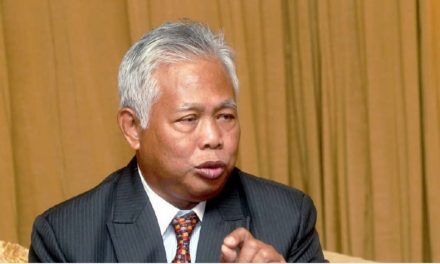Over the last few years, Malaysia has been making the headlines for the wrong reasons, among them massive corruption, illegal logging, treatment of transgender, weaknesses in key government institutions, ministerial blunders and more recently the massive flooding.
But of late, Malaysian companies have been penalised for using forced labour. It took the US Customs and Border Protection (CBP) agency to tell us how to treat our migrant workforce, although many of us are aware of what is going on.
Isn’t it a shame that we did not realise that we were treating our foreign workers like dirt until the CBP stepped in? It imposed the Withhold Release Order on eight manufacturers, six of which are highly profitable glovemakers. The other two are palm oil-linked companies Sime Darby Plantation Bhd and FGV Holdings Bhd.
The orders effectively stop products from these firms and their subsidiaries from entering the US.
A check with the US Homeland Security website shows that China tops the list of countries that it says are guilty of allowing forced labour practices, based on the International Labour Organization’s 11 indicators.
There are 44 Chinese firms listed since the CBP started monitoring the situation five years ago to stop products that are shipped from manufacturers and producers who ignore the ILO indicators. Nine have so far had the WROs lifted.
Malaysia comes second with eight companies but two have had theirs lifted so far.
The problem with these WROs is that it takes a long time before they are removed.
Top Glove, which the CBP praised, took 14 months and US$30 million (RM125 million) before its products were allowed to re-enter the US, after efforts to lift the workers out of their pathetic living conditions and debt bondage.
Let’s be very clear, the problem of the atrocious way some employers treat the migrant labour force has much to do with the companies which focus on reaping huge profits, with little regard paid to the welfare of the workers.
While you cannot fault the government for some of these inhumane practices, it is definitely guilty of lax enforcement, corrupt practices in recruitment and not appearing to be serious enough to stop this.
With this neglect, Malaysia has become a haven for cheap labour with millions ending up as undocumented foreign workers. Don’t forget, there are cases pending in court which involve corrupt practices in the recruitment of migrant workers.
The matter of forced labour was serious enough for CBP to hold a virtual press conference with the Malaysian media last week and explain the US stand.
The officials were very clear in saying that they do not target any company or country. “The CBP truly wants Americans not to be consumers of goods that are manufactured against the values of the nation,” said its spokesperson.
This was followed by a joint commentary by British high commissioner Charles Hay and US ambassador Brian Mcfeeters in Malaysiakini expressing their desire to work with the Malaysian government to eradicate forced labour. I am sure it was not a coincidence.
They did not mince their words when they said: “While the Malaysian government must take proactive and sustainable action to prosecute traffickers and protect victims, Malaysian companies also have a role to play. Indicators of forced labour are well-known, and these practices violate Malaysian law.
“Rock bottom wages and poor treatment of migrant workers also hurt economic development and growth at the macro level. The problems that poor treatment of migrant workers create for Malaysia’s image in the global economy makes moving manufacturing up the value chain and creating skilled, well-paying jobs for Malaysians more difficult, hampering the country’s broader growth and development aspirations.”
As if these were not enough, two recent opaque actions of the government in handling the memorandum of understanding for labour recruitment with Bangladesh and Indonesia are not helping the situation.
Firstly, the unnecessary secrecy in the MoU with Bangladesh has raised more questions than answers. There is much hue and cry in Bangladesh with NGOs and groups representing the recruitment agencies demanding that no syndicate be allowed to monopolise the intake of workers. In the past, this is what happened resulting in the workers being cheated and abused.
Human Resources minister M, Saravanan is refusing to divulge details of the MoU especially on the cost of bringing in the workers, something which will obviously expose the “huge” profit margin the agencies will enjoy, according to those in the know.
For those who don’t know, this industry involves billions of ringgit. So there are claims that some groups in Bangladesh and Malaysia are trying to control this movement of workers.
Then came the bungle with Indonesia on the MoU for maids. Saravanan said in January that the MoU will be signed on Feb 7 in Bali. It caught Jakarta by surprise which said that no such dates were discussed as there is still much work to do.
What Indonesia wants is simple, to abolish the practice of maids coming in with tourist visas and then applying for a work permit.
Indonesia’s contention is to protect its citizens from being cheated and abused, as coming in with a tourist visa in the past had resulted in these problems. Direct entry means the Indonesian government loses track of those entering Malaysia.
Indonesia just does not want these abuses to happen. I wonder why Malaysia is reluctant here. Has the government forgotten we are in the lowest Tier 3 of the US’ human trafficking report which is mainly linked to forced labour and abuse of foreign workers and their recruitment?
Many Malaysians seem to take pride in the country’s monetary and materialistic success without giving a thought to whether we treat workers with respect, a culture that we grew up with.
Worse, we are allowing foreigners to teach us a lesson in humanity, especially when we thump our chests to tell the whole world that Malaysians are the most hospitable people.
The authorities and the private sector ought to realise that migrant workers should not be treated like mere commodities if Malaysia does not want to be on the many lists that make us look inhumane.
Tough enforcement is pertinent now as the government has started allowing workers from Indonesia, Bangladesh and Nepal in again.








